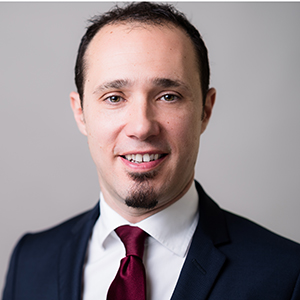Overview
A Course Led by Professor Edward I. Altman and Other Leading Experts
We are pleased to offer an in-depth and unique course on up-to-date and traditional principles and models on one of the most important risk management areas in today’s financial environment – Credit Risk. Led by world famous scholar and Senior Advisor to many corporate and regulatory organizations, Professor Edward I. Altman from the NYU Stern School of Business, Dr. Altman is also Co-Founder and Senior Advisor to the SME Credit Analytic Firm, Wiserfunding, Ltd, with locations in London and Mumbai. This 6-module course will discuss and train credit practitioners, financial regulators, firm advisors and executives and instructors in finance on such topics as:
- Fundamentals and Classical Techniques of Credit Risk Management
- The Altman family of Z-Score models - what have we learned over the last 50 years
- Applications of credit risk default prediction models for Lenders, Investors in Fixed Income and Equity Markets, Board members, Invoice financers, Firm managers, Firm Advisors, M&A Specialists, and Turnaround Professionals
- Analyzing COVID-19 and the Credit Cycle in the U.S. and India
- The usage of Artificial Intelligence and Specialized Models and Techniques for analyzing and assisting Small and Medium Sized firms (SMEs)
- Investing in Distressed and Defaulted Firms and Debt Securities
- References to Case Studies of firms in the U.S., Europe and India
Our other leading instructor-experts are Dr. Gabriele Sabato, Co-Founder and CEO of Wiserfunding, Ltd. (London) and Dr. Robert Benhenni, CEO of QFA, Inc. (New York and Paris) Lecturer at the University of Bergamo, (Italy) and Portfolio Advisor to Classis Capital, SpA. (Milan).
Where relevant, we will provide classic and recently published cutting-edge articles, written by our instructors, to course participants.
Who Should Attend?
- Credit Practitioners
- Financial Regulators
- Firm Advisors
- Executives & Instructors in finance
Agenda
-
5:30 PM – 7:30 PM
Module 1: Credit Scoring Models and the Altman Family of Z-Score Models - What Have We Learned the Last 50 Years
Instructor: Dr. Edward I. Altman, Professor of Finance, NYU Stern School of Business & Co-Founder and Senior Advisor to the SME Credit Analytic Firm, Wiserfunding, Ltd.
This two-hour module will explain the development of classical and modern credit scoring techniques and their introduction into the scholarly and practitioner environments. Combining traditional financial statement indicators with powerful statistical techniques, the original Altman Z-Score model (1968) has pioneered the development of generations of subsequent techniques on a global level in order to provide objective, accurate and cost-effective methods to enhance predictive accuracy and sophistication for a range of practical uses. Mini-case studies from the USA and India will complement the descriptive and analytical discussions. Professor Altman returns to India for this training program and will draw upon his extensive experience in researching and applying these credit risk management and distressed risk prediction techniques.
Discussions will cover:
- What was it like doing credit-risk research 50+ years ago
- Combining Traditional and non-traditional statistical analytics to enhance the Information content of financial and qualitative data
- Extensions of the analysis from Manufacturing Firms only, to the coverage of more generalized sectors and countries, including emerging markets
- Exploring applications to the restructuring of distressed firms, including the decision as to whether to bailout a major company, like General Motors, or explore the benefits and costs of bankruptcy
- The importance of Bond Rating Equivalents and Mortality Rate Analysis
- Comparing Models with Bond and Loan Ratings from Credit Rating Agencies (CRAs)
-
4:00 PM – 6:00 PM
Module 2: Traditional and New Credit Markets and Instruments
Instructor: Dr. Robert Benhenni, CEO of QFA, Inc. & lecturer at the University of Bergamo, (Italy) and Portfolio Advisor to Classis Capital, SpA. (Milan)
This module will explore traditional bank and non-bank lending markets and instruments. In addition, Dr. Benhenni will discuss new structures and markets, such as the credit default swaps (CDS), Collateralized credit instruments on Loans (CLOs), bonds (CBOs), credit cards, auto receivables, etc. and models using capital market data.
Discussions will cover:
- Bank and Non-Bank (Shadow Bank) markets
- BIS Standards for Estimating Probability of Default and Loss
- Stress Testing a Band or Non-Bank Portfolio of assets
- Portfolio Credit Risk Modeling
- Bank Portfolio Risk Management of Loans and Investments
- The Rise in importance of Structured Credit Markets and Instruments
- Securitization of Mortgages, Loans, and Bonds
-
4:00 PM – 6:00 PM
Module 3: Evaluating and Investing in Distressed and Defaulted Firms and Securities
Instructor: Dr. Robert Benhenni, CEO of QFA, Inc. & lecturer at the University of Bergamo, (Italy) and Portfolio Advisor to Classis Capital, SpA. (Milan)
This module will emphasize Dr. Benhenni’s extensive practical and scholarly work on Distressed Debt Markets and exploring the Anatomy of Distressed Debt Investing. This market has become an important new factor in the Indian sub-continent and a growing market globally, especially during the Pandemic.
Discussions will cover:
- The Size and Importance of Distressed Debt Markets Before and After COVID-19
- Empirical Evidence on Investing in Defaulted bonds and Bank Loans
- The importance of Debt Seniority and Recovery Rates
- Predicting Defaults and Distressed Investing
- Return/Risk Tradeoffs and Results of Distressed Investing vs Other Risky Asset Classes
-
4:00 PM – 6:00 PM
Modules 4: Analyzing and Assisting Small and Medium Sized Firms (SMEs) in Credit Markets
Instructor: Dr. Gabriele Sabato, Co-Founder and CEO of Wiserfunding, Ltd.
This module will explore the importance and vulnerability of SMEs globally. Path breaking, new techniques to assess the credit worthiness of firms in this crucial segment of financial markets will be highlighted. In this context, learning about how the latest techniques are changing the face of traditional credit risk assessment for SMEs can be a competitive advantage. Understanding what the most appropriate sources of data are, and how data can be downloaded and processed in a few seconds, are the new frontiers in this sector’s credit risk management. In this module and course, we will explore all the main elements of the powerful mix of risk and technology for SMEs. Dr. Sabato will draw upon almost 20 years of experience in banking and financial markets, and more recently, in a Fin-Tech successful startup. Recently, he has become focused on the Indian SME market and his firm, Wiserfunding, Ltd. Has a subsidiary based in Mumbai.
Discussions will cover:
- Why SMEs are different and what variables matter when developing models to assess their credit risk
- The role of SMEs in domestic markets, globally
- The competitive landscape in modelling SME Credit Risk
- Scholarly and Practitioner attempts to model SME credit risk. How to measure the prediction power of SME models. What are the latest technologies to support real-time decisioning for SMEs. How to process structured and unstructured data and the use of APIs in the context of Big Data.
- Lessons learned from the Italian Mini-Bond Market since 2014 and the potential relevance for India. What are the latest developments in the Indian market and available sources of data for SMEs
- The development, testing and Implementation of the SME Z-Score Approach
- Combining Traditional and Statistical Credit analytics with Artificial Intelligence, Governance and Macro-Financial data to build a path breaking technique to assess and assist SMEs
- Applications of SME Credit Assessment for Multiple Institutions and Markets, including lending, invoice financing, direct private firm financings, and SME firm valuation
- SME assessment in the COVID-19 period – Stress Testing
-
4:00 PM – 6:00 PM
Modules 5: Analyzing and Assisting Small and Medium Sized Firms (SMEs) in Credit Markets
Instructor: Dr. Gabriele Sabato, Co-Founder and CEO of Wiserfunding, Ltd.
This module will explore the importance and vulnerability of SMEs globally. Path breaking, new techniques to assess the credit worthiness of firms in this crucial segment of financial markets will be highlighted. In this context, learning about how the latest techniques are changing the face of traditional credit risk assessment for SMEs can be a competitive advantage. Understanding what the most appropriate sources of data are, and how data can be downloaded and processed in a few seconds, are the new frontiers in this sector’s credit risk management. In this module and course, we will explore all the main elements of the powerful mix of risk and technology for SMEs. Dr. Sabato will draw upon almost 20 years of experience in banking and financial markets, and more recently, in a Fin-Tech successful startup. Recently, he has become focused on the Indian SME market and his firm, Wiserfunding, Ltd. Has a subsidiary based in Mumbai.
Discussions will cover:
- Why SMEs are different and what variables matter when developing models to assess their credit risk
- The role of SMEs in domestic markets, globally
- The competitive landscape in modelling SME Credit Risk
- Scholarly and Practitioner attempts to model SME credit risk. How to measure the prediction power of SME models. What are the latest technologies to support real-time decisioning for SMEs. How to process structured and unstructured data and the use of APIs in the context of Big Data.
- Lessons learned from the Italian Mini-Bond Market since 2014 and the potential relevance for India. What are the latest developments in the Indian market and available sources of data for SMEs
- The development, testing and Implementation of the SME Z-Score Approach
- Combining Traditional and Statistical Credit analytics with Artificial Intelligence, Governance and Macro-Financial data to build a path breaking technique to assess and assist SMEs
- Applications of SME Credit Assessment for Multiple Institutions and Markets, including lending, invoice financing, direct private firm financings, and SME firm valuation
- SME assessment in the COVID-19 period – Stress Testing
-
5:30 PM – 7:30 PM
Module 6: Applications of Credit Risk Prediction Models and COVID-19 and the Credit Cycle
Instructor: Dr. Edward I. Altman, Professor of Finance, NYU Stern School of Business & Co-Founder and Senior Advisor to the SME Credit Analytic Firm, Wiserfunding, Ltd.
This last module will explore Professor Altman’s extensive experience in developing and implementing Credit Risk models for numerous applications to a range of Practitioners and Regulators. These applications can be divided into two dimensions: From Outside-Analysts to the firm and from Inside executives and Board members. In addition, Dr. Altman’s recent work and unique perspective on analyzing COVID-19 and the Credit Cycle will be highlighted.
Discussions will cover:
- Applications for Banking and Non-Banking Lenders
- Investors in Credit Instruments; Bonds, Loans and Structured Products
- Investors in Equity Securities and Baskets of Stocks
- Accounting Auditors and Financial Regulator Applications
- Credit Rating Agencies Applications
- Commercial Advisors Applications
- M&A and Private Equity Specialists
- Firm Managers, especially in Managing A Financial Turnaround
- Covid-19 and the Credit Cycle – How to analyze and forecast the impact of COVID-19 on Credit Markets
Experts
Edward I. Altman
Professor of Finance, NYU Stern School of BusinessDr. Robert Benhenni
CEO of QFA, Inc.Dr. Gabriele Sabato
Co-Founder and CEO, Wiserfunding, Ltd.Do you have any queries?
Drop us a line and we will call you.




